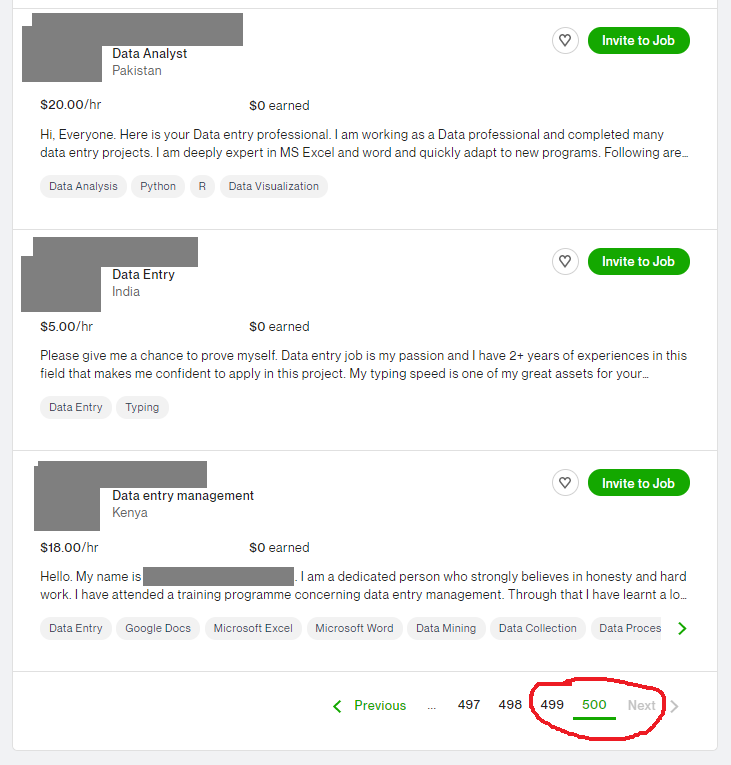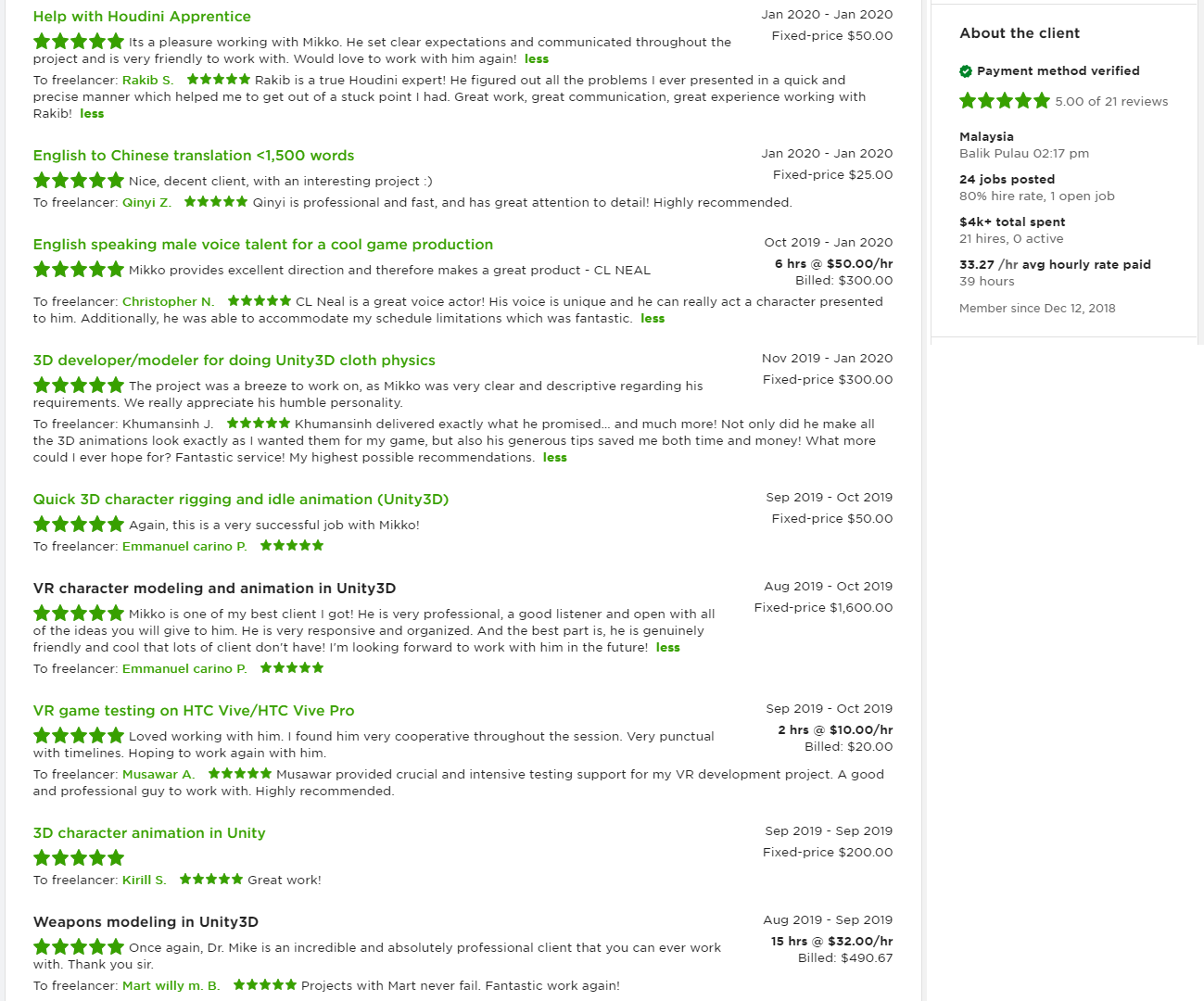
- by Dr. Mike
Running your own freelance business is one of the coolest things you can do in 2021. Unfortunately, many leave their day jobs with false hopes and unrealistic expectations. Lots of folks going freelance don’t at first realize that running a freelance business is like running any other business in the end. You must have paying customers and you need to have sales channels to find them efficiently, your business operation needs to be both good and fast, and you have to make working with you a great experience too. Every business needs to have these parts figured out.
But before going freelance, you may not yet be aware of these things. So, here are my TOP4 freelance myths about freelancing that you should know before taking the jump off the cliff.
1. Joining a freelance site makes you a freelancer
One of the biggest illusions in the entire freelance industry is probably this: Many, particularly young people who are not yet inside their industry, think that joining an online freelance site makes you a freelancer.
It doesn’t. Really, it does the opposite!
Joining a freelance site is just a short sign-up process. It doesn’t require anything. But becoming a freelancer who doesn’t get any pay without drawing it from the (global) markets requires many so things! Particularly, if done online, you would need to know:
- How to position yourself in the global competition (see: Freelancing – It’s an Expert’s Game)
- How to identify a niche where you have a good chance of success (which could be just a small part of the services you would be able to offer… see: How to Start Freelancing and Make It to the Global Top – My First Year on Upwork)
- How to make your online profiles attractive (see: Freelancer Profile Writing 101 and Freelancer Profile Writing 102)
- How to write compelling proposals (see: Have You Proposed Right? Parts 1-3)
- How to draw all the requirements from each client (see: $1,000 per Day as a Software Developer: The Secret Behind My “Ludicrous Speed”)
- How to deliver results in a way that the client understands and appreciates (see: Code of Conduct for Online Freelancers, Part 1)
- How to balance between various kinds of assignments (short, mid-term, long-term… see: One Hectic Month as Freelance Developer, Startup Consultant, Inventor, Professor, Etc.)
And there is more! All this comes on top of your core execution skills (e.g. programming, copywriting, logo design, etc.).

Half of the people joining Upwork, for instance, never make a single dollar there. The platform’s search function doesn’t show more than 500 pages of $0 earners and knowing how popular Upwork is, this is just the tip of the iceberg.
I believe this is the illusion that makes so many people join sites like Upwork, Fiverr, Guru, Freelancer, Truelancer, etc. with high hopes and after a year, without seeing a single dollar despite all the effort, become frustrated and quit. And then say the platform is bad.
Many platforms are quite good! And they have distinct differences that can make one site good for one person but completely unsuitable for another (for instance, it is hard to imagine myself finding ideal clients for my IP consultancy on Fiverr… I wouldn’t be able to package it in a way the platform requires).
These sites, in the best case, offer a great way to do your marketing almost automatically! But only if you master freelancing. And, of course, it is better to master it before you dive in!
On a personal note here, based on the discussion with hundreds of starting freelancers, I’ve concluded that freelance sites are probably the worst places for learning how to freelance. You won’t get much feedback before accidents happen. And if it happens in the beginning, it’s already too late! I’ve seen many people torpedoing their online track records during the first steps which actively prohibit further steps. To actively avoid that fate, take a look at these 10 Freelancing Hacks You Should Know Before Joining a Freelance Site.
2. To succeed in freelancing, you just need to be good at what you do
Many people think that having great skills and being good at what you do make you a great freelancer.
Nope. A big nope!
If you’re the best programmer, best designer, best writer, or best of just about whatever skill that would make up the foundation of your business, you’d still need to master the art of freelancing, i.e. running a one-person business.
Being good at what you do is the minimum requirement. Every freelancer has great skills! Bad ones don’t even think about doing freelance because of their lack of confidence. So, if you have a similar skillset and are in competition with many others, is it the best programmer or the best business person who wins the race in the long run?
Being good means you can deliver great stuff. But a great delivery alone doesn’t bring good cash. The difference between those freelancers who quit after their first year (because of lack of $$$) and those who manage to maintain and even grow their businesses for years is obvious. It’s the ability to build and manage a one-person business. That requires:
- An idea of how to position your own work and niche in the value chain of your domain in relation to what your competitors offer
- A clear definition of your dream clients you aim to find
- An efficient way to reach those clients (i.e. marketing and sales processes)
- An ability to network to expand that clientele
- Good communication skills (great is even better)
- Some branding skills (or at least, you have to have a brand)
You could be one of the world’s best programmers and yet completely suck as a freelancer. Clearly. Simply because you wouldn’t be approachable. Because nobody knows you or what you can do for them. You would always be searching for clients inefficiently, therefore, losing time from execution to a futile sales process. Not a winning recipe.

Not building your business skills will keep you stuck and lonely, wondering how to connect with your clients.
However, you could also be just an average programmer with excellent freelancing skills and make a small fortune for having great happy clients!
It’s the business skills that make the difference in the long run, no matter where you do it, be it in the local circles or the global online marketplaces.
Freelancing is a skill on its own. It’s a combination of business skills, personal time management, and project management. If you’re great at both delivery and freelancing… well, you might get to live on a coconut island one day! 😉 See a practical example in this article: Being a Freelance Software Developer – It’s Not About the Code.
Many who are just starting their freelance careers seem not yet to understand that those skills need to be built consciously. And preferably, in a short period of time. The fastest way is to learn from someone good directly, e.g. in a form of apprenticeship. Freelancing is not taught in school (or in those ridiculous 10-hour freelancing courses). 😀
3. Freelancers work alone
A surprising illusion in freelancing is that freelancers work alone. And well, yes, some do. But many don’t… at least not the best ones.
Actually, working completely on your own may not be a cost-efficient or even anywhere near productive approach!
We freelancers are great at specializing in our niche areas, so it should be a natural thing to do to hire other freelancers for tasks you’re not good at. Because, simply, others do it better and faster!
As a software professional and a science & tech type of guy, I’ve found it very practical to get many support tasks done by others, for instance:
- Bookkeeping
- Website admin tasks
- Proofreading
- Lead generation
- Graphic design
This way, I don’t need to spend time on things that I’m not specialized in, which leaves my time free for using my core skills. Therefore, I have higher efficiency in my business process!
And you can go beyond support tasks. By teaming up with others makes you can take on bigger projects! I’ve been hiring, for instance:
- Freelance 3D modeler
- Freelance graphic artists
- Freelance animators
- Freelance voice actors
- Freelance testers
- …
We don’t work completely alone. It’s not even efficient to do things 100% solo. Not only is the work done better for many parts, but it is also a lot more fun! You can even build a small ecosystem around your core service which makes you always keep the largest slice of the pie whereas the smaller part is split into still nice and decent slices for other freelancers. A good example is provided in this article: What is CTO-as-a-Service and How I Do It as a Freelancer.

My Upwork client history demonstrates how hiring others for various small roles is a smart business move.
A lot of good suggestions from others are listed in this LinkedIn post. Many freelancers have proven to be very creative in optimizing their businesses!
(PS. Well-established freelancers make the best kinds of clients for younger ones!)
4. Freelance business doesn’t require any starting capital
Perhaps the biggest of all illusions in freelancing is that starting a freelance business doesn’t need any capital.
Indeed, you don’t need much. But spending $0 is pure fantasy.
Good at marketing yourself? Excellent, then you don’t need to pay for lead generation, branding support, social media promotions, online visibility, etc.
Good at accounting and taxation law? Good, then you don’t need to hire an accountant, ever.
Great at doing business? Fantastic, then paying a commission to a reputed mentor is not mandatory for you.
Great at contract legalities? Brilliant, you don’t need to hire a lawyer.
Even joining freelance sites may not be free. For instance, Upwork costs you something in terms of Connects that you need for sending proposals (which BTW you need to know exactly how to write… so there can be a big cost in just learning that skill).
See where this goes? You need an initial capital for business use, not just savings that you eat up while hoping to succeed in getting clients. Think about freelancing in business terms and you run much faster than most!
Otherwise, you need to learn every single thing yourself, and every learning process has a cost of some sort attached to it. My gut feeling is that the reason why so many freelancers seem to quit after about 2-3 years is that they haven’t fully understood the nature and the amounts of these costs… and then suddenly realize that the learning process hasn’t even finished yet! That’s too long a time before seeing some financial success.
Mostly, people try to work their way through everything by spending their time on every single task. The ability to use your funds (that for sure you have as nobody starts freelancing without having at least some savings) can be a major advantage over those who don’t spend a penny… and that includes almost everyone else, sadly. But that is a good thing for you! 😉

You won’t end up begging if you use the funds that you have strategically.
Read more about using your money on strategic boosters for your freelance business in the article How to Avoid Being a Business Idiot When Going Freelance.
Why do we need to debunk these freelance myths?
Freelancing, when done remotely and globally, is very hard even for seasoned experts. The business building side of things requires many skills and there are far too many perils on your way to success. Perhaps even knowing all the 9 Freelancing Hacks for Starting Freelancers won’t be enough.
I hope that the debunking of the above four myths gives you a more realistic impression of what is it is like, what challenges you might face, and what parts are truly difficult. Perhaps it helps you avoid most troubles. Typical issues, failures, and complete disasters are demonstrated in the infamous Freelancing Failures section. You might even avoid financial pitfalls if you learned how to Science the Shit Out of Unstable Freelance Income!
If any of this helped, I would be thrilled to hear from you. Feel free to send me some feedback via LinkedIn!
Dr. Mike
Mikko J. Rissanen, Ph.D., a.k.a. Dr. Mike, is an accomplished solopreneur living in a tropical paradise, inventing cool tech and coding from his beach office... and eating coconuts all day, every day. He has been running his one-man show in Penang, Malaysia, since 2014 until he moved the business to the United States as I2 Network in 2021. He is one of the most highly paid freelancers on Upwork and he has been supporting hundreds of starting freelancers since 2017. Follow his latest tips on LinkedIn or seek his personal guidance as a CoachLancer member!